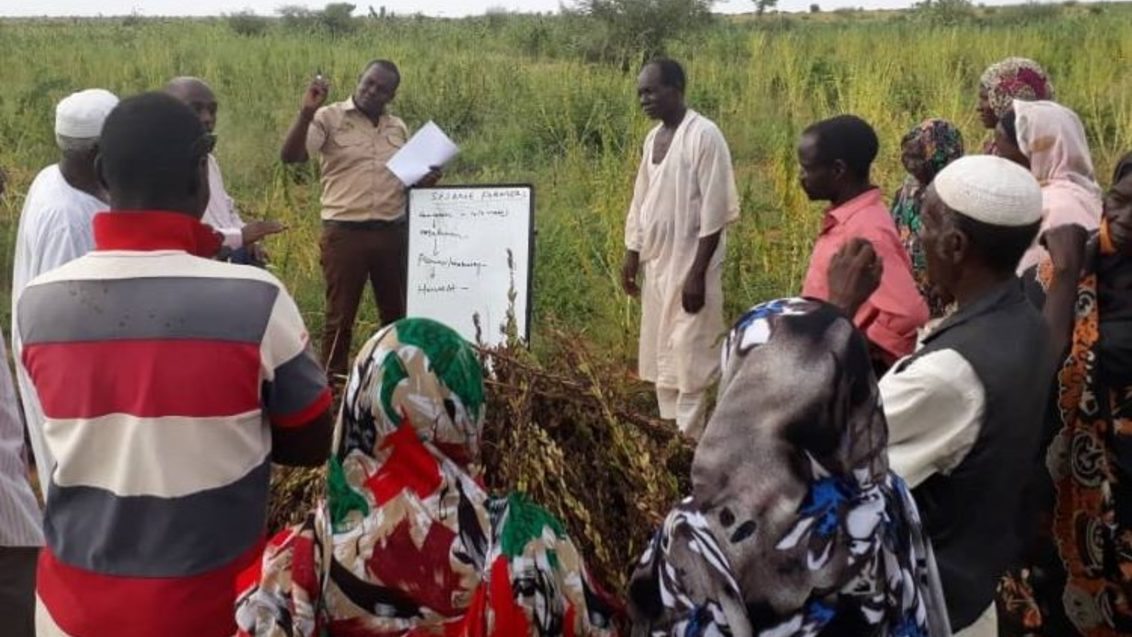From cash at home to insurance by phone?

How financially literate are smallholders in Sudan? A pioneering survey recently provided insights. The results will help shape educational material and support greater use of digital tools and insurance.
As recently noted elsewhere on this news page*, financial education is an essential part of smallholder empowerment. Education is a door-opener to financial inclusion, an important aspect of agricultural development. Together with Ebdaa Bank, we recently examined the financial habits and attitudes of 150 farmers across four states in Sudan. Funding for this first-ever such assessment and a related financial education initiative comes from the Arab Gulf Programme for Development (AGFUND) and the Swiss Capacity Building Facility (SCBF).
«We designed this baseline survey to assess smallholders’ financial literacy and knowledge gaps», explains David Muigai, Head of Actuarial in our Agricultural Insurance stream. «The aim was also to help tailor a suitable education program in response.» Financial literacy and insurance go hand in hand.
What did the survey find? «Most participants understand the need to track savings, but don’t really know how much cash they have available», says Michelle Oluoch, a market developer in our Insurance team. «Farmers usually just spend money as it comes in. When unexpected expenses arise, they turn to friends or family. Although many farmers are clients of financial institutions, they look elsewhere for loans.»
The survey also pointed to other features of smallholders’ financial behavior. «Most of them save money at home», Michelle discovered. «They feel this is the most secure method. It also allows them immediate access to cash, which is how most payments are settled». Some of the savings go towards school fees, but a lot are used to hire farm workers during peak seasons. Future financial training will thus include topics such as reasons for saving, use of bank accounts and budget planning.
In sharp contrast to Kenya, electronic systems are barely used in rural Sudan. «Stepping up the use of mobile technologies and digital platforms will play a key role in empowering smallholders financially», comments Enock Sing’oei, a Syngenta Foundation market development advisor. «It will also increase the uptake of insurance.» Enock is seen presenting on our photo.
In the area of farm insurance, too, Sudan lags far behind Kenya. «Few survey participants had ever applied for an insurance product», our Actuarial Climate Risk Analyst Jackline Chemtai** knows. «This is because they lacked both an understanding of the application process and information on risk management in general.» A few participants had tried insurance, but poor experiences have left them with a negative view of such protection. «On the bright side, however, the majority of surveyed farmers would like to transfer their risk to an insurer», comments Jackline . «That is a great opportunity.»
Further good news is that many survey participants would be interested in learning more about money management and financial products. «They recognize the importance of financial literacy, but tend to see the related education as out of their reach», reports Michelle Oluoch. «Our partners and we now aim to make it highly accessible.»
Next steps on this path include developing suitable training material. «We want to provide smallholders with techniques and tools that match their needs and schooling level», declares Bakri Hago our Agricultural Insurance Coordinator for Sudan . «The survey also showed the need for locally tailored material, as the results varied considerably between the states.» As usual, new financial offers will also need to fit smallholders’ expenditure and income cycle – loan repayments, for example, need to be after harvest. As elsewhere, it will also be important to involve a wide range of local stakeholders able to shape opinion, motivate farmers and lead by example.
*Here’s a report on our financial education activities in Cambodia
** Meet Jackline in our interview
